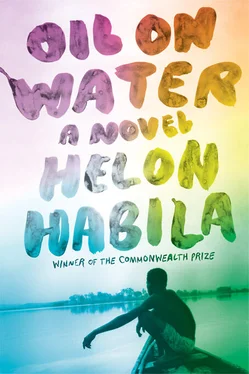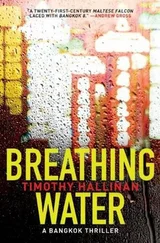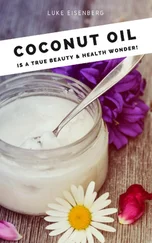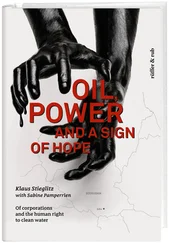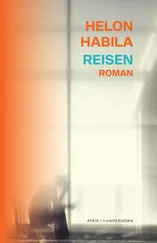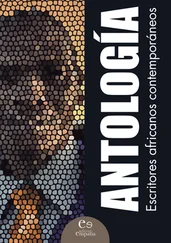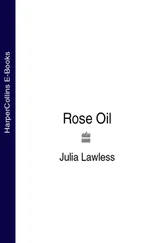She looked beautiful, her smile cheerful.
— Did you meet Zaq?
— Yes. He was quite chatty today. I think he’s recovering very well. Just keep him away from the bottle.
I wondered what she and Zaq had talked about. I wondered what her story was, why she wasn’t married, or if she had been married before.
— Have you eaten?
— No. Actually, I’ve been cooking and I was going to invite you and Zaq to come and eat at my place. But Zaq said he wasn’t hungry.
— So—
— So you have to eat for both of you. Come on, let’s go.
I followed her through a path in the woods and after a few meters it was as if we had stepped into a different dimension, away from the sea and sculptures and huts and worshippers. The tall iroko trees shaded the sun completely, and whenever a single ray found its way through the million leaves and branches and fell on our skin or on the dead leaves below, it looked so pure and startling, as if it had been refined through a thousand sieves. But at last we came out of the foliage into the busy village: sudden, noisy, alive with movement, and with smells from a hundred pots in a hundred kitchens. The roads were dusty and open, the houses few and well kept — they had verandas at the front and narrow windows that let in the noise and dust. We passed men seated on chairs, their heads bent, their mouths open, sleeping away the afternoon as chickens poked around for tidbits between the legs of the chairs.
Gloria’s room was in a huge, rectangular compound with a leafy gardenia tree in the center. She said there were very few such tenement houses in the village, since there wasn’t much need for them, the village being without any form of industry to attract outsiders. Almost every house was a family home. The shrine was the main industry, and after it came fishing. Sometimes outsiders visited the shrine and took pictures of the sculptures. Sometimes they rented a room for the night in the tenement compound. None of her cotenants seemed to be about: the thick wooden doors were shut and silence hung in the air like the black smoke from the faraway pillars.
It was a tiny room, and, seated in the only chair, I constantly had to move my feet out of the way as she bustled about to get me something to eat. In a corner was a table with a few jars of body cream, and a hairbrush, and a mirror and a cup with toothbrushes and a tube of toothpaste. The wind through the small square window played with the flimsy curtain.
— So, tell me about Zaq.
— What do you want to know?
— Have you two known each other long?
— No, not really. This assignment is the second time we’ve met.
— He told me that. . that. .
— That what?
She turned away, avoiding my eyes, moving about as she spoke, picking up things and putting them down again. She placed a plate of jollof rice before me.
— He said you told him that you think I’m attractive?
— Well, yes. I think you’re attractive.
She smiled and shook her head and for the first time she stopped moving. She wiped her hands on the kitchen towel she was holding, then she hung the towel on a hook. I went over to her. I put my hand around her waist and drew her against me. She turned her face as I tried to kiss her and my kiss landed on her cheek. She looked at me.
— I’m much older than you, you know. And—
— And?
— I have a fiancé. In Port Harcourt.
Slowly I let my hands slip down from her waist. But she took my hands and put them firmly around her hips, pulling me against her.
— Are you so easily discouraged? Aren’t journalists supposed to be very, very persistent?
I tried again, and this time she let my lips descend on her open mouth, her eyes fixed on mine. I spent the night with her, in her narrow bed, and all night long she held me tight, as if to stop me from slipping away in the dark. I woke up once and saw the wind lightly shaking the flimsy lace curtain on the window, and I felt as if the wind were blowing through the fields of my mind, gently stirring up particles in forgotten corners. Then I went back to sleep.
— TELL ME ABOUT the Englishwoman.
It was morning. I had dressed but she was still lying in bed, the sheets drawn up to her neck. I could see the outline of her breasts beneath the sheets.
— Naman told me you were going to ask me that.
— And?
— And he said to tell you all I know.
— We’re reporters, Gloria. It’s our job. You’ll be helping us. Zaq and me.
She sighed and stared at a hanger on the wall over her bed bearing her nurse’s uniform, white and crisp, waiting to be worn.
— Well, what do you want to know?
— Tell me about the woman. You attended to her when they brought her here.
— Yes. She was in the room where you’re staying now.
— Naman showed us her grave. Could she have died from natural causes?
— She was weak and dehydrated. But that wouldn’t have killed her.
— Did she talk to you, anything in secret, anything at all?
— No. I attended to her only once. There were men holding guns in that room. Wearing masks. I was too scared even to look at her properly. I wouldn’t recognize her if I saw her again.
— Then what?
— Well, afterwards one of the men walked me out and told me if I talked about the woman or about the men to anyone, terrible things would happen to the community, and it would be my fault.
— How many were they? Did they talk to you?
— About ten of them. They stayed for only two nights, and they kept to themselves. They talked only to Naman. They left not long before you first arrived.
— I don’t know what your plans are, but her death could mean big trouble for the community. As soon as we report it, the police and army will be here. They’re sure to arrest some of your people as accomplices. You have to think of leaving here, at least until this thing blows over. Think about it.
She appeared unhappy talking about the kidnappers and the white woman.
— It just doesn’t make sense.
— What?
— Her death. It was so sudden. She didn’t look like she was dying.
— Maybe they killed her accidentally. Maybe she attempted to escape. I have to go now. Zaq will be waiting for me. We have to decide what to do.
— Will I see you later?
— Yes.
THE NEXT NIGHT, around midnight, Zaq woke me up holding a lamp close to my face. He sat down beside me.
— Our job is to find out the truth, even if it is buried deep in the earth.
I watched him, an ominous feeling creeping up my chest. He had a crazy look in his eyes, I could smell the drink on his breath, and he hiccuped as he gave his little speech.
— This is something we must do. You have no choice. Without this our mission will be incomplete. Come with me.
And, half excited, half petrified, I followed him. The night was silent, broken only by the faraway sound of waves beating against the shore, and what might have been the call of bats or owls or other night birds. We walked through the ranks of the staring statues, which was rather like running an ominous gauntlet, a staring match with the unblinking, unmoving figures. At the edge of the sculpture garden was a toolshed whose rusty lock Zaq effortlessly broke with a single twist. He handed me a pick and a shovel and we set out for the cemetery. I was cold, whether from the chill air or from nerves, I wasn’t sure. Zaq’s portly frame strode before me purposefully, holding up the lamp as if it were a shear cutting through the dense foliage of night. When we got to the white woman’s grave he squatted down beside it, the lamp still in his hands.
— Dig.
As I dug he took out the whiskey bottle from his pocket and filled his mouth, and when I paused for breath he handed me the bottle.
Читать дальше
